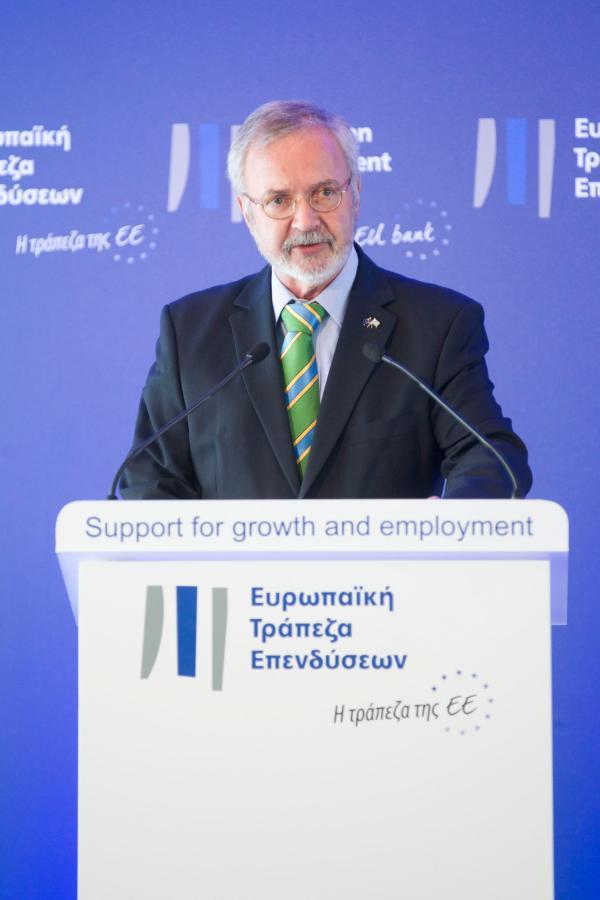
The European Investment Bank (EIB) is providing a total of up to EUR 550 million for motorways, local authorities’ infrastructure and, for the first time in Greece, “jobs for youth” SME funding.
The four finance agreements were signed today in Athens in a public ceremony attended by the Minister of Finance Yiannis Stournaras, the Minister of the Interior, Giannis Michelakis, the Minister of Development and Competitiveness, Kostis Hatzidakis, and the Minister of Infrastructure, Transport and Networks, Michalis Chrysohoidis, as well as EIB President Werner Hoyer.
The finance agreements were signed on behalf of the EIB by Mihai Tanasescu, Vice-President responsible for Greece, with the Minister of Finance Yiannis Stournaras, concerning the motorways, and with Alexandros Antonopoulos, President of the Consignment Deposits and Loans Fund, for the local authorities, as well as with two major banks for SMEs, represented by Artemis Theodoridis, General Manager ALPHA Bank, and Ioannis Lembidakis, President of Pancretan Cooperative bank.
On this occasion, EIB President Werner Hoyer stated: “Only five months after the signature of the innovative trade finance agreements we designed especially for Greece, I am pleased to be back to sign a EUR 550 million package of finance for what Greece needs most: growth and employment. We are helping the Greek State to proceed with the construction of the country’s major motorways, the local authorities to realise investments to improve living conditions, and two major Greek banks and long-time partners to continue to provide loans to SMEs as well as to launch a new pilot finance product tailored to “jobs for youth”.
EUR 350 million in favour of the Hellenic Republic for the Greek motorway programme
The EIB loan will be supporting the State’s financial commitments in favour of the country’s main transport corridor (Patras-Athens-Thessaloniki), which is also a trans-European priority transport investment. The loan will finance the construction of 239 km of new motorways and smaller upgrades on 434 km of existing motorways located along this main axis. The EIB support of the Greek motorways is the first tangible step by a financial institution towards financing the resumption of construction works which, considering their strong impact on employment and GDP growth, play a special role in revitalising the Greek economy.
EUR 50 million with the Consignment Deposits and Loans Fund for local authorities
This is a framework facility that will provide financing to local authorities in Greece through the Consignment Deposits and Loan Fund (CDLF). The facility will enable the local authorities to invest in the fields of transport, educational infrastructure, cultural and historic heritage, rehabilitation of public buildings, environmental improvement, energy efficiency and tourism infrastructure. In view of the existing substantial investment requirements of local authorities combined with the current budgetary constraints, the EIB’s facility will help to improve living conditions of thousands of citizens all over the country.
EUR 150 million for SMEs in tandem with Greek partner banks
These funds, of which EUR 100 million will go to Alpha Bank and EUR 50 millionto Pancretan Cooperative Bank, which are among the top banks in Greece with extensive branch networks and wide SME portfolios, are being provided under the Guarantee Fund for Greek SMEs specially established in 2012 to cater for the financing needs of SMEs in Greece. These new signatures bring the total under the SME Guarantee Fund to EUR 300 million since end-2012. The EIB funds are intended to finance projects promoted by small and medium-sized companies in the fields of industry, tourism and services in Greece.
In addition, the Pancretan loan will, as a pilot scheme, include a window for financing under the “jobs for youth” programme. This new EIB product is being provided for the first time in Greece, under the dedicated youth employment programme launched by the EIB in July 2013, as part of a larger initiative of Member States and the Commission to tackle youth unemployment, following the decision of the European Council in June 2013. This targeted product focuses on countries with difficult labour market situations for young people.
The funds will finance SMEs in the fields of industry, commercial services and tourism which fulfil one of the following youth employment eligibility criteria. They must:
- have employed at least one additional young person in the previous six months (or plans to employ an additional young person in the coming six months) calculated from the date of signature of the agreement with the partner bank,
- offer vocational training or internships/training programmes for young people,
- cooperate with a technical college/school/university to employ young people (e.g. during summer internships).

Photographer: EIB ©To be defined
Download original

Photographer: EIB ©To be defined
Download original

Photographer: EIB ©To be defined
Download original

Photographer: EIB ©To be defined
Download original

Photographer: EIB ©To be defined
Download original

Photographer: EIB ©To be defined
Download original

Photographer: EIB ©To be defined
Download original

Photographer: EIB ©To be defined
Download original

Photographer: EIB ©To be defined
Download original

Photographer: EIB ©To be defined
Download original

Photographer: EIB ©To be defined
Download original

Photographer: EIB ©To be defined
Download original

Photographer: EIB ©To be defined
Download original

Photographer: EIB ©To be defined
Download original

Photographer: EIB ©To be defined
Download original